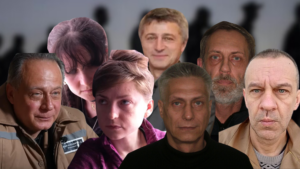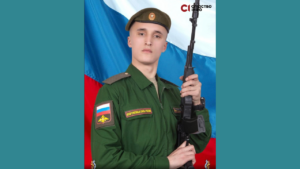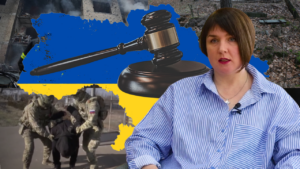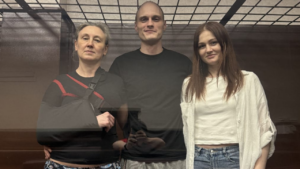Nine Russian soldiers convicted of war crimes in Bucha: analyzing the first verdict
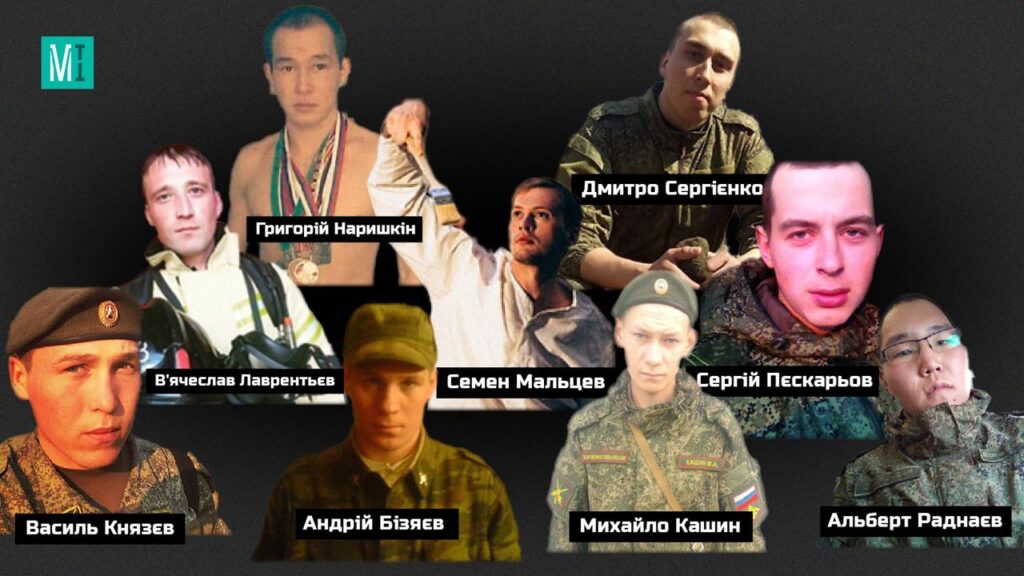
Irpin City Court convicted nine Russian soldiers in absentia for the war crime of ill-treatment of a civilian in Bucha. The victim had been imprisoned three times, beaten, had his hands tied with plastic ties, had his eyes taped over, and had been threatened with death.
The location of the Armed Forces, territorial defense, and communication stations were among the details that the Russian military demanded from the man who repairs electronics. This sentence was the first to be passed for war crimes committed during the occupation of Bucha in March 2022. From the beginning, MIHR journalists followed the trial: they recorded the victim’s testimony and the evidence provided by the prosecution.
Debates
A little more than a year after the events investigated in the case, the trial reached the home stretch as the parties moved to the courtroom. This stage fell on a “memorable” date for the country-occupier and its military – May 9, 2023. The prosecution and defense delivered their speeches in the courtroom, which, like the entire court building, was damaged by shelling during the occupation of Irpin a year ago.
Prosecutor Serhii Shubchyk asked the court to sentence the nine accused Russian soldiers to 12 years in prison. Which is the maximum sentence provided for in Part 1 of Article 438 of the Criminal Code “Violation of the Laws and Customs of War,” under which the soldiers of the 64th Guards Motorized Rifle Brigade from Khabarovsk Krai were charged: Junior Sergeant Viacheslav Lavrentiev, Privates Grigorii Naryshkin, Vasilii Knyazev, Sergei Peskarev, Albert Radnayev, and Corporals Semen Maltsev, Mikhail Kashin, Andrei Biziaev, and Dmitrii Sergienko.
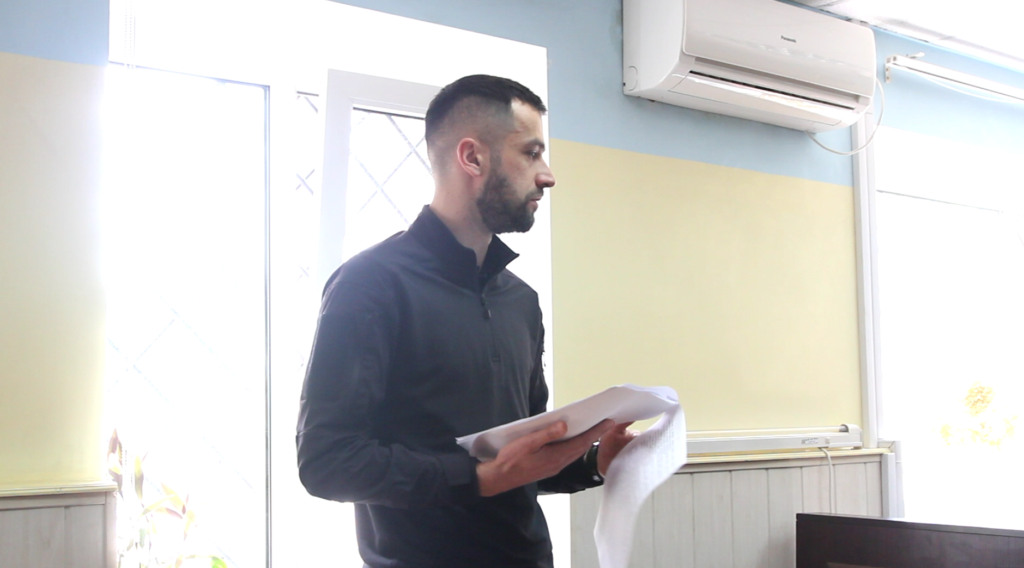
Prosecutor Serhii Shubchyk during court debates, photo by MIHR
“In my opinion, such a verdict will be fair, consistent with the degree of public danger and the circumstances of the criminal offense and the requirements of the criminal law on the inevitability of punishment,” the prosecutor said during the debate.
According to the prosecution, the guilt of the Russian military has been thoroughly proven and confirmed by the evidence examined during the trial. The main ones are the victim’s testimony, who identified the nine defendants from the photo, and the investigative experiment with his participation.
Nine of the defendants had two lawyers from the Free Legal Aid Center. Andrii Stepaniuk, the lawyer acting for Biziayev, Sergienko, and Lavrentiev, asked the court to reduce the sentence to 11 years and 6 months in prison.
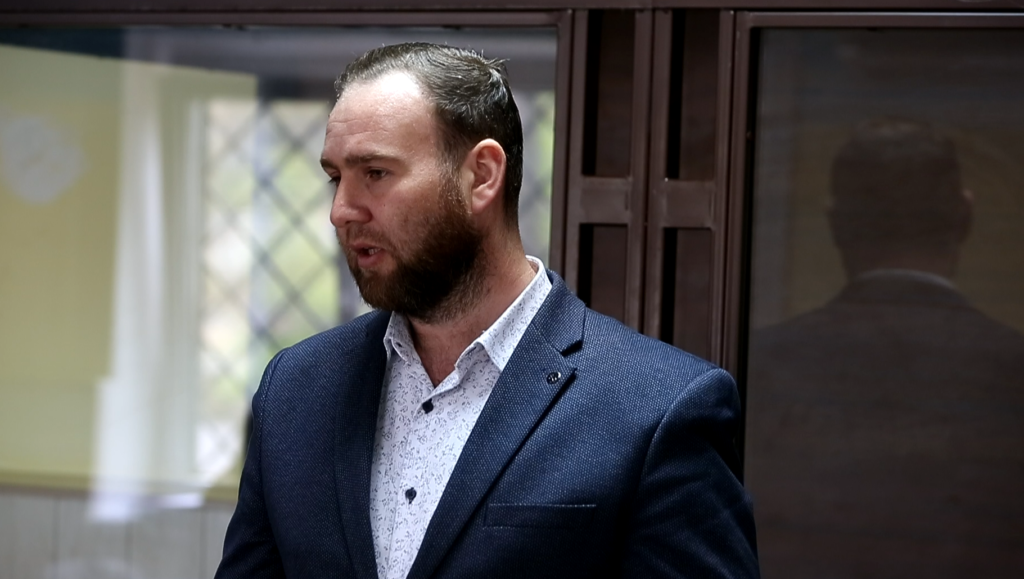
Lawyer Andrii Stefanyuk, photo by MIHR
“I proceeded from the fact that there are legal requirements, there are requirements for doubt. If there are any doubts about the evidence and other circumstances, they are interpreted in favor of the accused. We don’t know the position of the accused: whether they are sincerely repentant or not, whether they plead guilty or not guilty. Therefore, in this regard, I asked for a somewhat lesser punishment,” said Andrii Stepanyuk in a comment to MIHR.
The lawyer also noted that he was unable to contact his clients. Since May 2022, nine defendants have been on the wanted list. Since then, they have never appeared in response to summonses to the investigating authorities, so in November 2022, the court decided on a special trial – the Russian military was tried in absentia.
“As a defense lawyer, I always stand for rights and evidence. That is why today I am pleased that these people are being tried, not by lynching or demonstrative execution, as we see happening to our prisoners of war. The state is fulfilling its guarantees,” the lawyer believes.
Sentence
When passing sentence, the court considered the aggravating circumstances (committing the crime by the prior conspiracy of a group of people), and no circumstances would mitigate the sentence.
The court found all nine Russian servicemen guilty of ill-treatment of civilians under Part 1 of Article 438 of the Criminal Code of Ukraine, “Violation of the laws and customs of war.” Commander Andrei Biziaev, who issued the criminal orders, was sentenced to 12 years in prison, four other Russian servicemen, Dmitrii Sergienko, Semen Maltsev, Mikhail Kashin, and Vasilii Knyazev, were sentenced to 11 years and 6 months in jail, and the rest were sentenced to 11 years in prison. Each of them will serve their sentence after being detained.
The court’s reasons
Taking into account the victim’s testimony that the defendants were in military uniforms, armed, on military equipment, and the written evidence of their membership in the Russian armed forces, the court did not doubt that the defendants understood the fact of the illegal crossing of the state border of Ukraine and their participation in military aggression against Ukraine.
According to the court, the victim’s testimony was consistent and logical, and the court did not find any significant differences between his testimony and what the prosecution claimed. The victim’s testimony is, in fact, the only direct source of evidence, so the court analyzed it carefully. It considered all three cases: when the civilian was taken prisoner, how he was treated, and where and in what conditions he was held.
The court concluded that the acts committed by the defendants constituted a severe violation of international humanitarian law and that their guilt had been proven.
Also, the court ruled that the indictment should exclude references to articles of the Rome Statute, which have not been ratified by Ukraine, as had been raised during the trial.
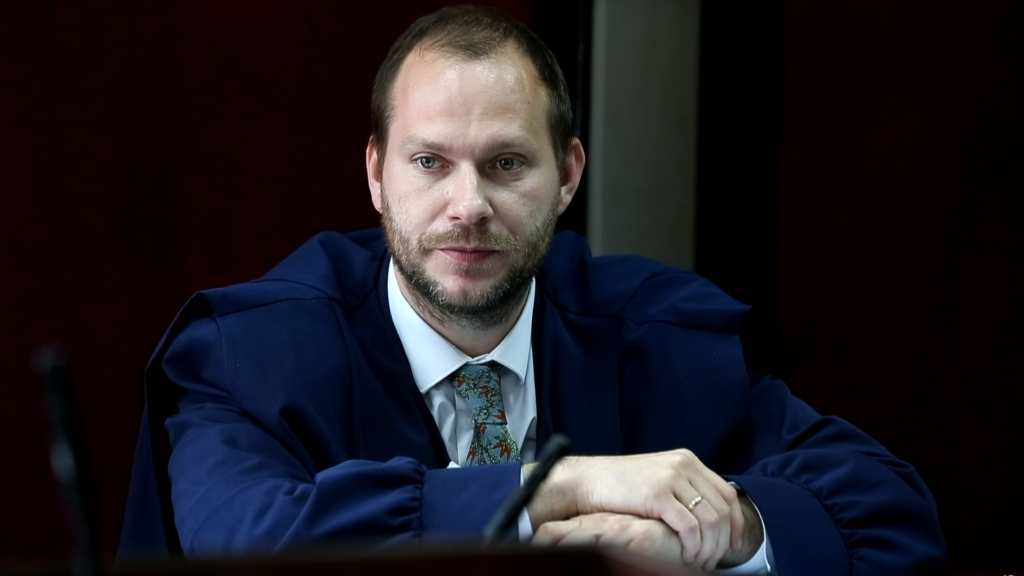
Judge Mykhailo Odariuk during the court hearings, photo by MIHR
This case is one of the few in which Mykhailo Odariuk commented on the verdict. Before the full-scale invasion, he worked as a judge in Izyum, where he heard cases against members of the so-called Luhansk People’s Republic and Donetsk People’s Republic. Later, he was seconded to Irpin, where he currently works on various categories of war-related cases, including war crimes.
“I cannot say that it was an easy verdict because, after the training on writing verdicts under Article 438 of the Criminal Code of Ukraine, you begin to understand what you need to pay attention to. Our British coaches told us that we should think from the defense’s point of view and question everything. In principle, this is how the verdict is written, and its severity is close to that of an acquittal. It is not known whether the convicts are alive or not. Still, they now have legally imposed sentences of imprisonment, a total of 102 years and 4 months in prison for 9 Russian militaries!” the judge wrote on his Facebook page.
The judgment has become final 30 days since it was announced, and no appeal has been submitted.

Iryna Domashchenko, MIHR jornalist


